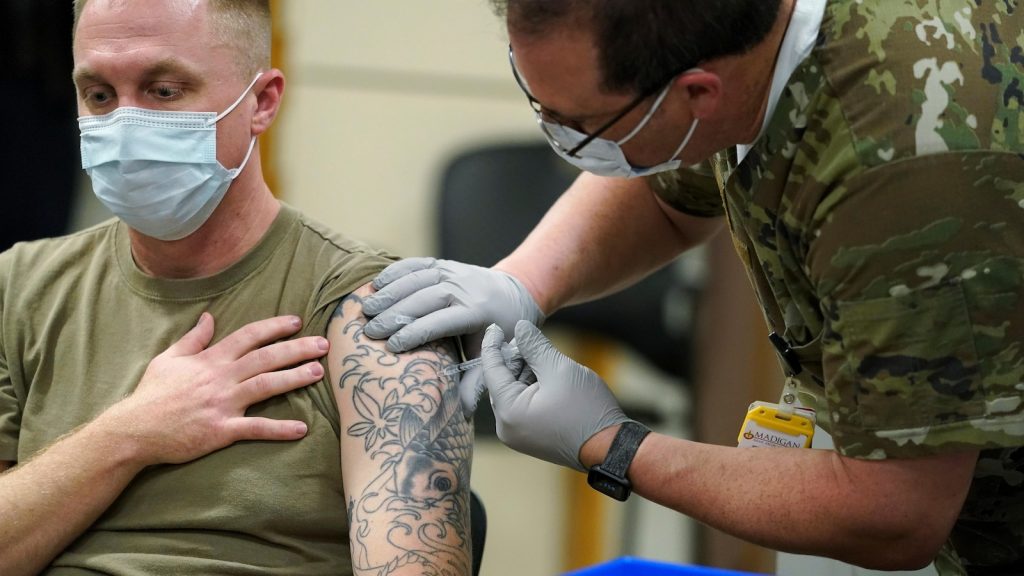In a notable shift in military policy, the Army has taken steps to reenlist over 23 soldiers who were previously discharged for refusing to comply with the mandatory COVID-19 vaccine. This decision reflects a broader reassessment of the military’s stance on the vaccine mandate, which had created waves of controversy and concern among service members.
Background on the Vaccine Mandate
The COVID-19 vaccine became mandatory for all service members, including those in the National Guard and Reserve, in August 2021. The measure was introduced by then-Defense Secretary Lloyd Austin, who argued it was crucial for maintaining a healthy military force. However, the resulting mandate led to significant pushback, with over 8,200 troops discharged due to noncompliance and refusal to receive the vaccine.
Under the administration of President Trump, a new directive has been issued to reinstate these individuals, emphasizing issues regarding military readiness and the need for personnel. Trump suggested that the mandate had caused the military to lose “some of our best people,” which initiated discussions for their rehiring.
Details of the Reenlistment
Out of the initial 23 soldiers reenlisted, three have returned to active duty, while the remaining number have enlisted either in the National Guard or the Reserves. They have each signed new contracts and have begun reporting to their respective units. Notably, the reenlistment process comes in light of new guidelines which increase the minimum service commitment from two years to four years for those discharged for refusing a lawful order to take the vaccine.
While the Army is leading these efforts, other branches of the military, including the Marines, Navy, and Air Force, are also reaching out to former service members. Each service has set up dedicated websites and outreach programs to facilitate this reenlistment process, signaling a concerted effort across the military.
Financial Considerations of Reenlistment
One critical aspect of this process is the issue of back pay. While soldiers may be eligible for back pay, significant deductions are in place. Any wages earned during their time as civilians and other benefits received will be deducted from the total amount they might anticipate receiving. Amid promises of reinstatement, there is a realization that many might not receive the full back pay they expect.
The Pentagon will also require service members to present verified tax records and additional paperwork as part of the reinstatement process. In a move to ensure transparency, the military will provide an estimate of the total back pay to each service member, ensuring they can make informed decisions on whether to reenlist.
Current Interest Levels and Outlook
Currently, interest in reenlisting appears limited. Reports indicate that while around 400 soldiers have inquired about the reenlistment program, only about 100 are actively in the application process. Among other branches, the Marines showed interest from 472 individuals, while the Navy and Air Force have yet to receive substantial feedback from discharged service members.
This trend raises questions about the long-term impacts of the vaccine policy on military personnel. Many individuals who left the service did so with the determination to move on, utilizing the vaccine refusal as a reason to depart.
Official Statements and Responses
Chief Pentagon spokesman Sean Parnell highlighted the importance of the new guidelines, suggesting that this process represents an accountability measure while acknowledging the varied perspectives among service members. This indicates an effort to create a more inclusive environment within the military as leaders seek to address issues of morale and retention.
The Bigger Picture
This development within the military reflects broader societal frustrations regarding vaccine mandates and individual liberties. It highlights how policies initiated as public health measures can lead to significant repercussions in organizational structure, personnel retention, and overall military readiness.
The ongoing discussions are likely to evolve as both the military and the public manage perceptions of COVID-19 vaccinations and their implications in various sectors of employment. The military’s response to this situation will play a crucial role in influencing future health policies across all branches of service.

